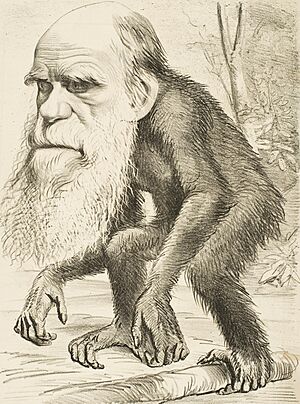Social responses to the idea of evolution facts for kids

The idea that all life on Earth has slowly changed over millions of years is called Evolution. This big idea was talked about a lot even before Charles Darwin shared his famous book, On the Origin of Species. Even today, people still discuss what evolution means for their beliefs and how they see the world. This often involves talking about how evolution relates to human life and what it means to be human.
Contents
Debates About Evolution
Some people believe in guided evolution or theistic evolution. They think that evolution is real, but that it is being guided by a higher power.
There are many different ideas about theistic evolution. Many creationists believe that the creation myth in their religion does not agree with the idea of evolution. As Darwin found out early on, the most debated part of evolutionary thought is what it means for where humans came from.
In some countries, especially the United States, there is a disagreement between people who accept evolution and those who do not. This debate is mostly about whether evolution should be taught in schools, and how it should be taught.
Other science fields, like cosmology (the study of the universe) and earth science (the study of Earth), also have ideas that do not match some old religious texts. These ideas were once strongly opposed too. For example, Giordano Bruno faced severe punishment for teaching that the Earth moved around the Sun.
Evolutionary biology often faces more opposition from religious believers than other groups.
The Catholic Church's View
The Roman Catholic Church now has a neutral position on evolution. Pope Pius XII said in his writing Humani Generis in the 1950s:
The Church does not stop research and discussions about evolution, as long as it looks into how the human body came from existing living matter.
Pope John Paul II updated this view in 1996. He said that evolution was "more than a hypothesis" (a scientific guess):
My predecessor Pius XII already said that evolution and faith about humans do not conflict. Today, new discoveries show that evolution is more than a hypothesis. This theory has become more important to researchers because of discoveries in many different fields.
The Anglican Communion (another Christian church) also does not oppose the scientific explanation of evolution.
Misusing Evolution
Many people who accepted evolution were not just interested in biology. They wanted to use the theory to support their own ideas about society.
What is Social Darwinism?
One example of using wrong ideas about evolution to support bad things is "Social Darwinism". This term describes the ideas of a 19th-century British philosopher named Herbert Spencer. Spencer had ideas about "survival of the fittest", which he applied to business and human societies.
Other people used these ideas to say that social differences, racism, and imperialism (when one country takes over another) were fair. Today, most scientists and philosophers say that the theory of evolution should not be used to support such ideas. They also say it is hard to find facts that support these claims.
Related pages

